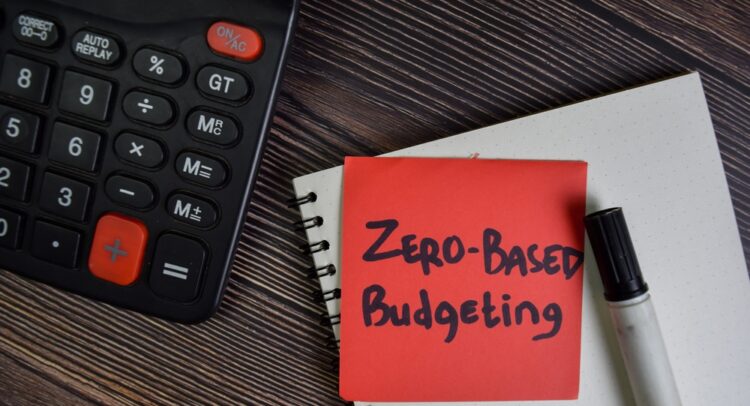Using a budget is synonymous with good financial planning. Budgets–whether they are for businesses, governments, or individuals–are designed to match income with spending. The zero-based budgeting approach is a hands-on method to make certain that every last dollar of an income is accounted for.
There are a number of different types of budgeting mechanisms that create a framework for your spending. Zero-based budgeting is one such system that can help keep you on track.
What is Zero-Based Budgeting?
Zero-based budgeting is the idea that every single dollar of earnings will be accounted for. You will end the month with a balance of “zero,” hence the name of this approach. The concept started in the private sector, where corporations would examine every single line item when looking anew at their expenses in every budgeting cycle.
This approach forces managers to justify all of their costs, rather than simply building off their previous budgets while making incremental increases each round. The goal of doing so is to look upon your budgetary allocations with fresh, critical eyes.
In other words, just because you made a certain purchase during the previous quarter, that does not automatically mean that you need to do so again. Each quarter, each purchase should be reconsidered. This approach helps companies avoid falling victim to inertia and simply continuing along with previous practices.
Applying Zero-Based Budgeting to Your Life
Many sound practices in the corporate world have relevance for households. Building a budget will help to ensure that you will be able to adequately plan for your upcoming expenses.
In order to use the zero-based budgeting approach, you need to start with a thorough understanding of your after-tax income. If your earnings are variable and shift from month-to-month, you can still use this method by looking at your previous earnings and making a conservative estimate for the minimum amount you can realistically expect to bring in during the coming month.
Once you have these figures at the ready, start by making an outline of all of your conceivable expenses. Similarly to the 50-30-20 budgeting rule, you should be able to separate these costs into buckets of needs, wants, and savings.
Every single expense you have listed needs to be justified. While this can be an intensive process, it has the advantage of forcing you to be intentional about every single one of your spending choices. Monies that you do not use for necessary items or discretionary desires will go towards savings or investments. These allocations also need to be fully understood, dissected, and justified.
The Pros and Cons of Zero-Based Budgeting
Before deciding whether or not zero-based budgeting is the right fit for you, make sure to understand both its benefits and disadvantages.
Benefits of Zero-Based Budgeting
(1) Comprehensive review: The biggest draw of zero-based budgeting is that it will force you to take an unrelenting accounting of every single dollar that you earn, spend, and save. If it is something that you need to buy, want to purchase, or decide to save, it will appear on your budget. At the end of the month, your income and expenses will be “zeroed” out, leaving no penny behind.
(2) Intentional by design: Another advantage of zero-based budgeting is that it will make you fully aware of each one of your spending decisions. This will help you to make an honest reckoning about each outlay, which can help cut out those costs which are not worthwhile. Whether you are creating your budget from scratch every month or basing it off of the previous one, reviewing every single decision will make certain that your spending is entirely intentional.
Drawbacks of Zero-Based Budgeting
(1) Labor intensive: The need to painstakingly review all of your decisions can be an intensive process, one that requires a significant allocation of your attention and patience. For many, their time would be put to better use focusing on other pursuits, while using another budgeting method that is not quite so burdensome.
(2) Less room for flexibility: With all of your expenses planned out, zero-based budgeting gives you less room for spontaneous spending. While there is value in cutting down on unnecessary consumption, you also do not want to restrict your freedoms to the point where you begin to resent your chosen budget.
Is Zero-Based Budgeting Right for You?
Zero-based budgeting is best suited to those seeking to strictly monitor their spending decisions. Because it requires a serious planning commitment, this system will fit only for those who have the motivation to take a deep dive into their financial decisions.
Indeed, here are a number of budgeting techniques available, many of which require less work to plan or adhere to. The 50-30-20 rule also requires you to be intentional with your financial decisions, though it does not necessarily mandate such a strict attention to detail.
Whether or not zero-based budgeting is the right path for you depends largely on your personality, though it can also be a smart option for those whose circumstances require them to keep a tight grip on their spending. If you believe that you will benefit from the meticulous monitoring of your finances, it could be a good fit for you.
Conclusion: The Best Budget for You
The purpose of a budget is to make sure that you live within your means today, while planning ahead for the future. The best budgets are the ones that will allow you to stick to your long-term goals, while also providing for your short-term expenses.
Zero-based budgeting offers one such template, but it is not the only one. By allowing you to fully understand where you money is going, it can be a powerful tool to gain control of your finances.
Being intentional with spending decision is the ultimate reason why organizations and households create budgets to begin with. Following a zero-based budgeting approach will help ensure this happens.
Learn money management, and use data-driven stock insights with TipRanks.
















